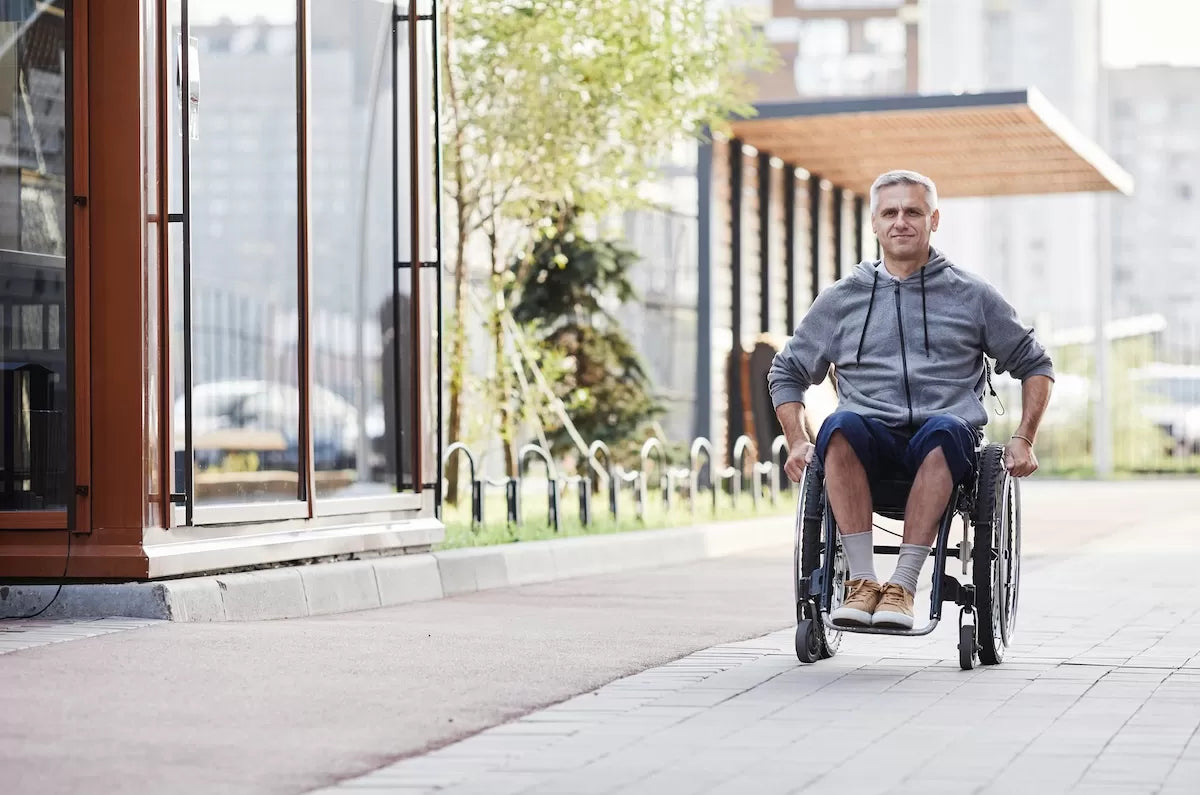When it comes to maintaining our independence, few things are as crucial as our ability to move around freely. Yet, for many individuals, mobility can become a challenge due to various reasons like age, disability, or injuries. This is where a mobility aid can come in handy, offering solutions that empower individuals to lead a fulfilling and self-reliant life.
In this article, we will explore the world of lifestyle mobility aids. We'll cover everything you need to know. From mobility aids for walking to high-tech mobility scooters, we'll help you understand these aids, choose the right one, and ensure you can enjoy life to the fullest.
Why mobility aids matter
Maintaining our independence is a fundamental aspect of life, and mobility plays a pivotal role in achieving this. Tools that aid mobility can support us when our ability to move is compromised. But what exactly are they, and how can they enhance your life?
What are mobility aids?
Mobility aids are devices that assist people with mobility impairments or limitations to move more easily and safely. While types of mobility tools like walkers and scooters are often viewed as mobility aids for seniors, all types of mobility aids for young adults exist as well. They can be classified into two main categories: ambulatory aids and non-ambulatory aids
Ambulatory aids
Ambulatory aids are devices that support people who can walk but need some assistance to maintain their balance or stability. They include:
Walking Canes and Crutches
Walking canes and crutches are like trusty companions for those seeking balance and support while walking. These simple yet effective aids provide stability and make moving around more comfortable. Canes and crutches can be used by those who have experienced an injury and are in the process of healing, or by those who have an intermediate level of mobility but need assistance for greater distances or lengths of time.
Shop crutches here
Walkers and Rollators
For those who require more support and stability than canes or crutches can provide, walkers and rollators are the way to go. Both walkers and rollators come in various sizes and options, such as those that fold for easy transportation, those with shopping baskets, or even as knee walkers.
Non-ambulatory aids
Non-ambulatory aids are devices that transport people who cannot walk or who have limited walking ability. They include:
Wheelchairs
Wheelchairs come in various forms, from manual to electric, and they're lifelines for those with more profound mobility challenges. Many also come with accessories for increased comfort, such as cushions and bags for oxygen cylinders.
Mobility Scooters
When it comes to enhanced freedom and independence, mobility scooters are in a league of their own. These electric vehicles allow those with limited mobility or who are not allowed to drive to get around with greater ease and comfort.
Lift Chairs and Stair Lifts
For individuals who struggle with standing or navigating stairs, lift chairs and stair lifts are essential tools. These need to be fitted at one’s home by a stair lift professional.
Who should use mobility aids?
Mobility aids can be used by anyone who has difficulty moving due to various reasons, such as:
- Aging: Aging can cause changes in the musculoskeletal system, such as loss of muscle mass, bone density, joint flexibility, and cartilage. These changes can lead to reduced strength, endurance, balance, and coordination, making it harder to walk or stand without assistance.
- Injury: Injury can result from accidents, falls, sports, or violence that damage the bones, muscles, ligaments, tendons, or nerves. These injuries can cause pain, inflammation, swelling, bruising, or bleeding that affect the ability to move or bear weight on the affected area.
- Illness: Illness can be caused by infections, diseases, or conditions that affect the organs, tissues, or systems of the body. These illnesses can cause symptoms such as fever, fatigue, nausea, vomiting, or diarrhea that affect the energy and hydration levels of the body. They can also cause complications such as anemia, diabetes, or heart failure that affect the blood flow and oxygen delivery to the muscles and tissues.
- Disability: Disability can be congenital or acquired due to genetic factors, developmental disorders, or environmental factors that affect the structure or function of the body. These disabilities can cause impairments such as cerebral palsy, spina bifida, or multiple sclerosis that affect the movement and coordination of the muscles and nerves.
What are the benefits of mobility aids?
Using mobility aids can have many benefits for your physical and mental health, such as:
- Improving your independence: Using mobility aids can help you move more easily and safely in your daily activities, such as getting out of bed, going to the bathroom, cooking, cleaning, or working. This can improve your self-esteem, confidence, and dignity by allowing you to perform tasks without relying on others.
- Improving your quality of life: Using mobility aids can help you access different environments and opportunities, such as visiting friends and family, shopping, traveling, or enjoying hobbies. This can improve your social and emotional well-being by allowing you to participate in activities that bring you joy and satisfaction.
- Improving your health outcomes: Using mobility aids can help you prevent or manage various health problems that are associated with reduced mobility, such as obesity, diabetes, cardiovascular disease, osteoporosis, or depression. This can improve your physical and mental health by allowing you to maintain appointments with healthcare practitioners.
How to choose the right tool to aid mobility
Selecting the right mobility aid is a pivotal decision. Factors that should be taken into account include your budget, lifestyle, and particular mobility needs. Some other considerations may include:
Your level of mobility: You should assess your current level of mobility and how it affects your daily activities. For example, if you can walk but need some support to maintain your balance, you might consider using a cane or a walker. If you cannot walk or have limited walking ability, you might consider using a wheelchair or a scooter.
Your level of independence: You should assess your level of independence and how much assistance you need from others. For example, if you can move around independently but need some help with transfers, you might consider using a lift. If you need constant assistance from a caregiver, you might consider using a non-ambulatory aid that is easy to operate and maneuver.
Your level of comfort: You should assess your level of comfort and how well you can adjust to using a mobility aid. For example, if you are comfortable with using your upper limbs and have good hand-eye coordination, you might consider using a manual wheelchair or a crutch. If you are not comfortable with using your upper limbs or have poor hand-eye coordination, you might consider using a power wheelchair or a scooter.
Your personal preferences: You should assess your personal preferences and how they match with the features and benefits of different mobility aids. For example, if you prefer a lightweight and portable device that is easy to store and transport, you might consider using a cane or a travel scooter. If you prefer a sturdy and durable device that can handle rough terrains and environments, you might consider using a walker or a heavy-duty scooter.
Lifestyle mobility aids
Mobility aids are the keys to unlocking and maintaining your independent lifestyle. Whether you need a simple walking cane or a high-tech mobility scooter, there is a solution for you. By understanding the different types, considering your unique needs, and following safety guidelines, you can move forward with confidence.
As you embark on your journey with mobility aids, remember that you're not alone. Healthcare professionals and mobility aid experts are there to provide personalized guidance. With the right knowledge and equipment, you can lead a life full of possibilities and independence.
FAQs
Q: Are mobility aids covered by insurance?
Yes, some mobility aids may be covered by insurance, depending on your policy and the specific aid you need. It's essential to check with your insurance provider for details.
Q: How can I determine the right mobility aid for my specific needs?
Choosing the right mobility aid involves evaluating your mobility requirements, consulting with healthcare professionals, and trying out different options to see what suits you best.
Q: What are the regulations for traveling with mobility aids?
Regulations may vary, but generally, airlines and other modes of transportation have guidelines for traveling with mobility aids. It's advisable to contact your chosen transportation service for their specific policies.
Q: What costs are associated with purchasing and maintaining mobility aids?
The costs vary depending on the type and brand of the mobility aid. Maintenance costs may include occasional repairs and battery replacements for electric aids.
Q: What safety precautions should I take while using mobility aids?
When using mobility aids, it's essential to stay aware of your surroundings, follow proper usage instructions, and ensure your aid is in good working condition. Always prioritize your safety.
As a leading supplier of durable and home medical equipment (DME and HME), ApriaHome sources and distributes a wide range of treatment solutions, including mobility equipment and aids.
We're here to support you as you work toward your improved health and well-being. We strive to meet your ever-evolving healthcare requirements with individualized attention and premium quality treatment solutions.
Looking to add mobility supplies? Browse our premium solutions and let us help you get the most out of every day.
Looking for advice? Our helpful agents are on call at (800) 780-1508 between 8:00 am - 10:00 pm EST daily. Get in touch today.





